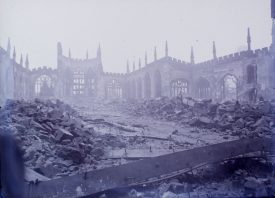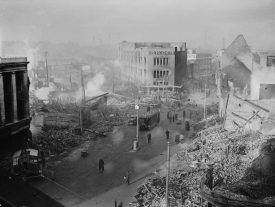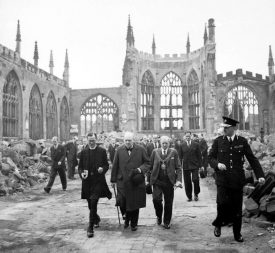Sunday school attendance [at Lawrence Saunders Road Baptist Church?] dipped sharply after the Blitz when children were evacuated and never recovered to its former numbers of over 100. For several Sundays after the Blitz the Sunday School shared their time and space with Radford Methodist Sunday School as their premises were bomb damaged.
A smell of cabbage
We were blessed in that we had very little damage and worship was maintained throughout. A fire bomb did come through the roof and lodged in the girder work but failed to go off. During the last days of the war the city council commandeered the premises as a canteen to serve the children of Barker Butts School (which has now been demolished and replaced with bungalows).
When we met on Sundays for worship we could still smell the cabbage that had been cooked earlier in the week in spite of the valiant efforts of Mrs Hewitt the caretaker to eradicate it. When the canteen was no longer needed our building was used as an extra room for the school sewing classes. And again the work put in by Mrs Hewitt to have the building spick and span for worship failed to find all the pins and needles that fell in the cracks between the floorboards and we saw them gleam when the lights went on.
Baptismal services meant overtime work for deacons as they worked to an hourly rota to heat the water in the copper pan in the kitchen and transfer it to the Baptistry until there was sufficient water for the minister and candidates to act. This was done on the Saturday then the immersion heater was put on overnight to keep the chill away till the baptisms took place.
A warm and friendly church
Mrs Hewitt was a gem of a caretaker and there is no doubt she made our reputation for being a warm and friendly church. She’d be out at 6.30 am on Sundays to stoke up the coke boiler and visitors would comment how lovely and warm the building was no matter how cruel the weather. It was the same all through the week for the various meetings. She was a tartar too for tidiness and came down like a ton of bricks if one persisted in leaving things or equipment about. Every August when practically all meetings stopped she would wash the walls with help of course but faithfully scrub the boarded floor herself. Her tender loving care enabled us to keep that building in good shape and use long after its ‘sell by date’ had passed.
Our prayers were answered
During the war the coke boiler heating broke down and we were driven to fervent prayer for replacement as being wartime everything was in short supply and one needed a license for such major things as boilers. Our prayers were answered in a surprising manner. News came through our secretary, D. Hill, that Gospel Street Baptist Church had been destroyed and they had a coke boiler buried under the tons of Blitz rubble and sections of which might be replacements for us if we could dig it out. So the secretary and able men of the church investigated. After much sweat and effort they found the boiler, sections of which could make repairs and so once again our church was warm and welcoming.
Originally published on the BBC’s WW2 People’s War website as the article Attending Church in Wartime. This article has been reproduced with permission of the BBC, and Warwickshire Libraries.










Comments
Add a comment about this page